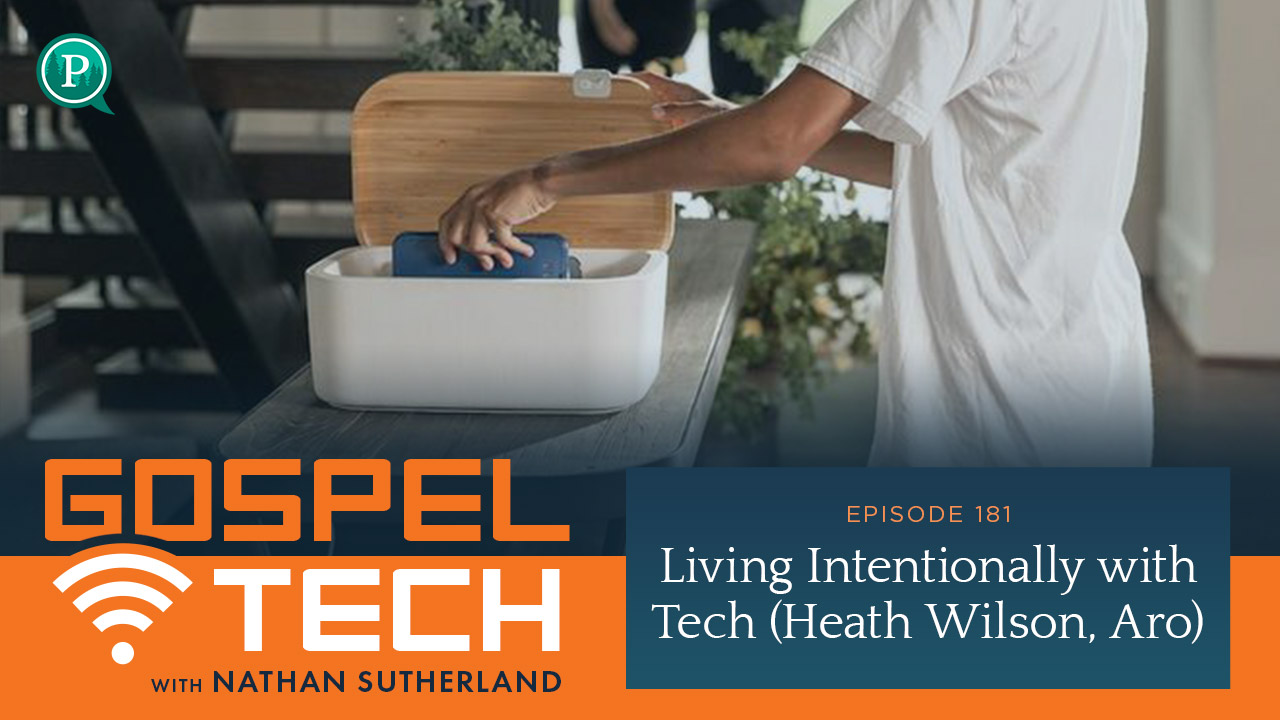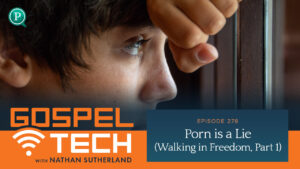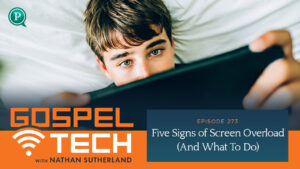Can we use tech to be more intentional with our tech? Heath Wilson, co-founder of Aro, thinks so. He’s co-founder of Aro, a device and app that help your family create healthy habits around the most powerful and pervasive device you own: your smartphone.
Transcription:
Nathan Sutherland:
Welcome to the Gospel Tech Podcast, a resource for parents who feel overwhelmed and outpace as they raise healthy youth in a tech world. As an educator, parent and tech user, I want to equip parents with the tools, resources, and confidence they need to raise kids who love God and use tech.
Hello everyone, and welcome to the Gospel Tech podcast. My name is Nathan Sutherland. And today we have with us Heath Wilson, co-founder of Aro. A device that I’m excited to introduce you guys to, and to talk a little more with Heath about this idea that it’s supposed to help us experience life uninterrupted.
Heath, welcome to the show. Thanks for being here.
Heath Wilson:
Hey, good to be here. Thanks for having me.
Nathan Sutherland:
Absolutely.
I’m really excited to talk to you about this, Aro, could you explain a little bit of what it is? And then we’ll get into a little more of your background on who you are and how you came to the spot.
Heath Wilson:
Yeah. Aro was started to solve my problems and my family’s problems. So this started from a place of personal failure, honestly. But the solution itself, it’s a combination of hardware and software that makes it easy to put down your phone, along the way it gamifies the whole experience, and nudges you along the way. And really, our intent is to help us live out… or help our customers live out their intentions. We all have these grand ambitions and intentions, but too many time life gets in the way. And in particular, that wonderful, beautiful, captivating distraction in our pocket usually is the thing that gets in the way.
Nathan Sutherland:
It certainly can. And so it’s, I mean, this box, effectively, that you’re putting it in, which I want to return to, because I don’t want to get too sidetracked by that, because Prednisone I can nerd out quick on that.
But tell us a little bit about yourself, your family. How’d you come to this idea that Aro needs to be a thing?
Heath Wilson:
Yeah. So I guess I would call myself an accidental entrepreneur. I was young at one point and met some guys and started a business, a different business, in the financial technology or fintech business, and ran that from almost 18 years. And I only bring that up because it’s relevant in terms of the RO story. So like most entrepreneurs, I got pretty attached to work. And for me that was email and staying busy. And I grew up with the Blackberry all the way to whatever version we’re on the iPhone now. And I distinctly remember that first device walking up the stairs to greet my wife. And I was so excited about it. And her recollection is very different. Her recollection is, “Oh, that’s the thing that got in the way of our relationship,” and intimacy and all those things. So I’ve failed many times over. Maybe that’s the best way to say it. I failed along the way.
And with reflection, with that business behind me, along the way, I had four children. So my family’s growing up in the middle of this experiment. And I started to see the world through their eyes, particularly when they became middle schoolers, late elementary, middle schoolers, where I thought, “oh, wow, we’re on the precipice of giving them infinity in their pocket. And dad has had infinity in his pocket and he’s not been a good role model of proper usage.” And even though I was, quote, unquote, adulting, they didn’t know any different. So living that experience, honestly, I just wanted to be better for my family. And more importantly, I wanted our family to be better when it came to devices. And that led me down a path of research and understanding and trying different solutions and just trying to figure out how we could create something that would make it easier for our family initially to get a handle on the management of the devices that were soon to be in our hands.
Nathan Sutherland:
So I love that idea that my kids don’t know I’m adulting. And we use that a lot, that idea of, well, of course I need to be on my phone because important emails and, “Don’t you like your life? This is how we afford it.” You come up with all these things. But at the end of the day, if it’s not the appropriate time to be adulting, we’re not really adulting well, are we? We’re modeling these unhealthy pieces. So I believe in one of the intro videos or one of the interviews that I saw, you mentioned specifically your son in a school project. He had a quote for what he wanted to get you for Christmas.
Heath Wilson:
It was a kick in the gut. And just to that point, they noticed at a very young age as well. So I think he was nine or 10 at the time. And it’s one of those projects their teachers gives him, “What do you think your dad want for Christmas?” And who knows? It’s normally a tie or some kind of electronics. And he said, “I want to give my dad the gift of family time.”
Nathan Sutherland:
Oh, yeah.
Heath Wilson:
So I read that and thought, “Oh goodness.” A nine-year old who wishes for that, that means I’m just not available. And that could be a combination of travel and other things as well. But the truth is, most of the time it was because I was adulting and I was working and I just wasn’t available for him. So that was one of those moments, there’s plenty of stories like that, that again highlighted, this is a big issue.
And then I had other life experiences with other people my age. I was in a couple mentoring groups with men. And honestly, like everyone said, “This thing, this device, is what’s keeping me from being the man I want to be, the husband I want to be, the father I want to be, the employee I want to be.” It was just ubiquitous across everyone. So at that point, the light switch went on and I thought, all right, there’s an opportunity to do something about it.
Nathan Sutherland:
So before we jump into the how does Aro help us do that, tell me a little more about your family. You mentioned a son in the process. How many kiddos you got and what age range are they in right now? As you said, you’re raising them up through the smartphone journey.
Heath Wilson:
So my wife and I have been married for 21 years. We have four kids. Our two oldest, boy, girl twins, almost 17. They’ll be seniors in high school, gosh, year’s almost over, so in days. Our middle son is 15, he’s a freshman, he’ll be a sophomore. And then our youngest daughter’s 13, we welcomed her through adoption. So we’ve got kind of an interesting story between infertility and adoption and everything in between. But I often tell people, we worked really hard to have these kids and fought for these kids and pray for these kids. So gosh, I kind of need to be present because this is what we wanted. That time goes by so fast. And actually, I’ve done some math recently. So again, I’ve got one more year with my two oldest. And if you calculate 45 minutes a night, let’s just say I get that much time with them during the week because they have activities in sports. Let’s say I get four hours in total on the weekend. If you add all of that up, over the next year, I have a total of 25 days with them.
Nathan Sutherland:
Wow.
Heath Wilson:
And I don’t say that to be depressing. It’s more of a jolt to say the time is now. Take advantage, be intentional. Put down the phone’s one example. But there’s other examples of how we can take advantage of that time.
Nathan Sutherland:
Yeah. I love that. My kids are nine, seven, and four right now. And you get into that, right? You do the math, I’m like, “Oh, I’ve got eight more summers with the old one.” You start doing the math. They’re like, then he is going to need a summer job, and then he is going to do awesome things that are great. But this is a really unique window, and that is just a great reminder. So you’ve got four kids, married 21 years. That’s incredible. And I love what you just added of life, we’ve prayed for these kids. Now comes the investment. I’ve been given this blessing and this opportunity, and it’s not punishment. It’s not taking away from my goals or whatever amazing other things you’re doing.
You’ve been a FinTech entrepreneur and now another co-founder. And I want to rest on that. I just wanted to let that settle a little, that idea of it’s so easy to be so intentional in the current time and not think about what I’m being intentional for. So being intentional for our kids, which brings us to Aro.
Heath Wilson:
Yeah.
Nathan Sutherland:
It’s a device, it’s software. It’s something to help me specifically in the area of my smartphone. I guess two parts. How do I do it and why my smartphone, out of all the devices?
Heath Wilson:
Well, it is built for families, and this is where it started. We wanted to solve it for our family and for my co-founder’s family. And we focus there because, look, it has to start at home. Changes have to start at home. And we came from the standpoint of saying, there’s so much negativity around devices right now, demonizing the phone itself, talking about addiction. Our perspective was, look, we just have bad habits. And if it’s just a habit, we have power over that habit. We can make changes. We just need a system and we need a place. And a lot of that’s built upon habit research and understanding the habit loop and how you form good habits and stop bad habits. But the idea was that most families, most individuals just haven’t thought through where does this phone actually live when I don’t need it? And for most of us, it lives in our pocket.
And if it’s not in our pocket, it’s right in front of us on a table. Or if we’re sleeping, it’s right on our nightstand. So we’ve just become accustomed over the years to having this thing with us 24 hours a day. And actually, the data says that 91% of Americans keep their phone within arms distance 24 hours a day, which is just incredible. And you talk about this a lot, but these things are designed for our attention. So we lack the ability, frankly, to temper our usage. And willpower gets overshadowed all the time. Discipline just doesn’t last too long. It’s just a challenge for all of us. So that’s what led us down this path of, okay, well, can we help people create better habits? Can we make it easy or easier, to begin with?
And my thought was, we can’t just build another app. We can’t put the solution solely inside of the problem. There has to be, and research now tells us that the only way to limit your usage with phone is to actually have it out of sight, out of your sight line as well. So that started with, hey, we also need something that can be in a kind of high traffic area in the house and a kitchen or family room. So it has to be beautiful. It also has to be a home decor piece. And then we said, all right, well, but it needs to have a component of gamification. So then we do need an app to encourage that ongoing usage. So it is this kind of combination of software and hardware that makes it easy to put down your phone. The box lives again in your kitchen or family room. It is that quiet invitation that says, “Hey, Nathan, hey, Heath, you’re home. Now’s the time to be intentional. Your phone goes here.” Whatever time is sacred to you, dinner time, reading time, morning time routines.
And it becomes a little bit of a, not in a negative way, but a great scapegoat to say, “Hey, let’s all do this together.” Not just me nagging, my wife or me nagging the kids to put down their phones. But hey, let’s all go Aro together, as we say. And then the beautiful thing of it is once you put it inside of the device, Bluetooth connection automatically starts tracking all of your time away. So it’s kind of the opposite of screen time and that it quantifies all of your intentional time. And then you have the ability to tag it and say, “Hey, family dinner,” or “Reading,” or “Journaling,” or whatever, to create this kind of beautiful electronic journal. And then of course, we’re nudging you and we’re really using a lot of social media strategies to keep you coming back and to give you a pat on the back and to make you feel proud of that time that you spend away from your phone.
Nathan Sutherland:
That’s beautiful. [inaudible 00:11:26] would be proud, by the way. He would absolutely love this. So it’s a device that I put my devices in. A software side that tracks the time away is an interesting idea. Does it track it? It doesn’t know which devices are in there though, it just knows when it’s closed?
Heath Wilson:
So each device is going to have obviously to app installation. So yes, it will know if it’s your device or my device, your wife’s device. And then you’re all tracking your time independent. Now you can compete. So you can say, “Hey, our family’s going to compete against each other. We’re going to set family goals,” or that type of thing.
Nathan Sutherland:
Loser has to buy ice cream.
Heath Wilson:
That’s exactly it. Or you get an allowance, you have this much time or you’re allowed to take the car out. There’s a bunch of different ways.
Nathan Sutherland:
Okay. All right. So it tracks individually. It tracks as a family. Does the box lock?
Heath Wilson:
No.
Nathan Sutherland:
Okay. So it’s not a time capsule situation.
Heath Wilson:
No.
Nathan Sutherland:
It’s simply an sight out of mind barrier. You drop this thing in and it-
Heath Wilson:
Yeah. One of the learnings we had early on is we couldn’t take a heavy-handed solution to this problem. Look, I would argue that, again, we’re very pro phone, we’re very pro technology. I would probably categorize this as anti screen time. So there are times when you need your phone. I mean, I’m at work, I need my phone. The classic examples, moms, when their kids are at school, typically are not going to put their phone away because they may get a call from the doctor or the school to come pick them up. So there are times that it makes sense to have your phone. We’re helping you build habits around those times where it doesn’t make sense. But because of that, we didn’t want to lock it. We didn’t want to tell you, put you in airplane mode. We didn’t want to do anything that embedded friction into the process. In fact, the whole goal is to remove as much friction as possible, so again, that it’s easy and becomes easier to put down your phone.
Nathan Sutherland:
Love that. And that’s for those 45 minutes a day, four hours on the weekend. Everyone can picture that one hour a day. We’re like, all right, this is our hour away, which is incredible. If we can choose to claim one hour a day or 30 minutes twice, whatever it is, if you can claim that, and that’s tech free, distraction free. Can I drop my smartwatch in there? Can I do that? Will that work?
Heath Wilson:
You can. And we haven’t built the app for the smartwatch. But I would actually argue that the smartwatch is kind of a great middle gap. So for those that are afraid of missing a call, the smartwatch is terrific. You typically don’t get lost doom scrolling on a smartwatch, or you look really awkward if you’re doing it. So we found that that’s a great addition.
Nathan Sutherland:
Great in between, between the two. That’s amazing. I guess let me ask first then, what does it look like for your family? Since you mentioned you were kind of testing this out, you made this for your family and for your co-founder’s family. What does that look like for you guys since this launched back in fall of last year, in this journey?
Heath Wilson:
Well, we’ve been testing for years, right? Because we started this few years ago. But in a short phrase, I would say it’s changed everything. For us, we’ve built kind of a digital muscle around not feeling so dependent to have it with us all the time. So it’s almost a reflex at this point. When we walk in the house, we’re using it. One thing I’ve learned, which is quite funny actually, is that I’m just not that important. So a lot of times, you carry your phone around, you think you’re important, you need to be accessible. That’s just not the reality. I’ve also become way more comfortable that, look, if something does happen at 2:30 AM with a grandparent or with someone else, the reality is I’m not going to be able to do anything. And me finding out about it at 6:30 AM is not going to change anything.
So I probably become just a little less fear driven, if that makes sense. Sure. But for us, family dinner’s always phone free. For me in the morning, I’ve got a rhythm and a routine around not having the phone with me. None of my kids sleep with their phones in their bedrooms at night. Now you don’t have to have an Aro to do that. That could just be a rule in the house. But I will tell you what’s fascinating is when I ask my teenagers about that, they said, “No, no, dad, every one of our friends has their phone in their bedroom at night.” So it’s way more prevalent than we probably think. And I would argue it’s way more serious than maybe we’re approaching this because just what we’re really talking about doing is restoring relationships and you put your phone down. And man, if we’re not putting some guardrails, if we’re not putting the systems in place, we’re just setting our kids up for failure in the future. So we’re pretty passionate about making a change there.
Nathan Sutherland:
No, that’s huge. And I want to hear the rest… Anyway, I have a follow up on that. But I want to just emphasize that idea of, yeah, there’s so much research talking about having a phone in the bedroom. And I have yet to find a study where it says it’s a good idea. We all do it, but I have zero… I have evidence that talks about bullies and about predators and about pornography and about anxiety and about sleep and about mental health and about. I can find you studies from the last 10 years on that. I don’t have a single one that’s like, oh, it’s a net gain. Here’s the reason you should keep doing it. And yet, nine out of 10, I’m certain that is accurate to real life for the number of kids who have smartphones that actually keep them on them throughout the night.
I mean, if adults are doing it, why wouldn’t the kids? So the two questions then, you mentioned your kids leave them out of the room, and that’s been a benefit that has changed kind of the way your family functionally works around the smartphone and that you are tech. How does it work when those kids normally have a phone on them, come to your house? Just how do you guys handle it? Not Aro specifically as far as the way you guys made the brand or the product, but how does that look when people visit?
And here’s where this is coming from. I was at a talk in Pennsylvania this last week, asked the kid, hey, we were making this family tech framework. How do we talk about tech? How do we apply it in real life? This came up. Should smartphones be in the house? I was asking her, “What did you most agree with?” She told me, “What did you most disagree with?” And she said, “Having the smartphone turned in when we come home. Why? My friends will never come over.” She just said they’ll never visit if they don’t get to have their smartphones on them. Have you seen that? Has the Aro played a role in that? And what might that look like for families raising young people?
Heath Wilson:
So again, we’ve got kids across an age range. I would say in that 11 to 14 year old range, maybe even 15. We’re pretty strict around taking up phones at, let’s call it nine or 10:00 PM, if we have a bunch of kids spending the night. And they get used to it. And actually, we’ve had a couple of my son’s friends say, “Gosh, I wish we had one of these at our house.” Because look, kids also crave connection, right? And what’s the number one thing getting in the way of their connection is phones are like the yawn effect. Someone starts playing a game, the next person’s playing a game, then the next person feels awkward. So they get on their phone. So when you remove that, wow, all of a sudden they’re creative again. All of a sudden they’re playing with each other instead of on their devices. So we found that to be pretty effective.
Now, once they’re 16, 17, I think part of our parenting style, in our family anyways, start to give them a little more freedom. We don’t want to send them off to college with full restrictions all the way through high school. So we’re letting them kind of monitor and extend the freedom a bit. But I will tell you, oftentimes, our daughter who’s almost 17 now will say, “Hey, dad, would you just remind us when it gets to be pretty late that we might want to put our phones up?” So she uses me as the enforcer, again, to get the connection. But I’ve seen them come over to do studying, and they would use the Aro to throw all their phones in, or they’ll throw them in when they go outside. So it has been, in a way, just again, a physical reminder that, “Hey, let’s put these things down. Let’s actually engage with each other instead of just poking around and showing each other what’s on the next TikTok video.”
Nathan Sutherland:
Which is all well and good as long as it’s supporting something else. But when that becomes our end, when that becomes, we’re all sitting in circle doing that, it’s a bummer. So then what would you hope this looks like for another family? If family uses it and you get the dream review, what would that review sound like?
Heath Wilson:
Well, what’s been fascinating to me is when we concepted this solution, we thought it was perfectly built for families with kids 11 to 14. But what we’re finding is a lot of families are incorporating it earlier. So actually, your kid’s age is perfect. And even younger. I mean, there’s stories of two and three year olds taking their parents’ devices and putting them in the Aro. And the reason they do that, and actually this is a quote from one of our customers, she thought she had lost her phone. So she asked her, I think four or five year old daughter said, “Hey, honey, do you know where my phone is?” She said, “Yeah, I put it in the box thingy.” She said, “Well, why’d you put it in the box thingy?” She goes, “Because you play more with me when it’s in the box thingy.”
Nathan Sutherland:
Yeah.
Heath Wilson:
Right? So we like to say people that love the Aro the most are the kids who don’t have phones because it equalizes the relationship in the family. So my hope is for this next generation that they can be the ones finally who have been modeled the appropriate relationship with devices, and they see their parents disengaging from their devices because look, in these conversations, it’s easy to focus on the kids. The truth is, the adults are the ones who are doing it wrong right now because we’re figuring this out as well. So if we can see that next family, by the time their children get phones, it’s almost automatic for them to put it away instead of automatically putting it in their back pocket. That’s a huge win.
And one of the statements that always motivates us, and I think we’ve kind of rallied around as an organization, is we believe if we don’t do something that this’ll be the first generation of kids that die with more memories of others than memories they create on their own. Think about that. Because all they’re doing is watching other people through their screen instead of being out in the yard playing, instead of whatever it is.
Nathan Sutherland:
That’s interesting.
Heath Wilson:
Coming up with a game, playing a board game. So we’re really focused on, hey, let’s help these kids create memories of their own instead of living vicariously through someone else.
Nathan Sutherland:
Yeah. It’s like the parasocial thing has gone all wrong. Yeah, I’m not just enjoying someone else, I’m experiencing their enjoyment. It crosses that line if I’m not having my own, and I love that. So the phrase you said was you want to help them make memories of their own rather than, because they could grow up and have more memories of other people’s lives than their own.
Heath Wilson:
Yeah.
Nathan Sutherland:
Yeah. That’s solid. So Aro then gives us the space to do that. It gives us the intentionality, models it. I would say I will second this idea that what I’m witnessing is kind of a groundswell of young people pushing back both against the industry with their purchasing habits, but against their parents and be like, “No, I want something more akin to a dumb phone. I want the thing that gives me my tool tech, it has a GPS, it takes pictures, it shares with friends, it communicates, and then it quits heckling me for my attention.” I want something more akin to Microsoft Word than to TikTok. I want something that does the stuff I want to do and nothing else.
And certainly, there’s social media platforms and stuff they want on there, but it is interesting to watch some of that pushback. And I think what you’re just saying there of even down to five years old of our kids recognizing that we as adults don’t do it perfectly. So that’s amazing. Thank you so much. Where can people find out more about the Aro, about what you guys are doing? Here, stateside, can we get this thing? Where can we get it? How’s it work?
Heath Wilson:
Yeah, we’ve been selling for a few months now. It’s at goaro.com, GOARO.com. And then mostly on Instagram, it’s Go Aro Now. It is a membership, so it’s not a one-time consumer purchase. It’s a membership. It’s anywhere from 12 to $18 a month, depending on how long and how you pay. We really wanted to remove all that friction so people could get their hands on it. And the feedback’s been amazing. We love the stories. Stories like a daughter telling her dad, an eight-year-old daughter, telling her dad, it’s the first time he’s ever watched a movie with her, without his phone. We have people telling us they’ve reduced our screen time by crazy amounts. And it’s just fun to see an entire family get set up, and you can see them start to compete with each other. Again, especially at a young age where you have the ability to instill those habits and just change your trajectory for how they’re going to use these, again, amazingly powerful, wonderful devices that we’re just trying to figure out.
Nathan Sutherland:
Yeah. That’s amazing. Well, thank you, Heath, for your time and for creating an awesome device. I’m excited to see more families use it. And if you’re listening to this, you want to know more, you can check out goaro.com. And you guys have a podcast as well, is that correct?
Heath Wilson:
We do. We do, we do. We talk with people who strive to live intentionally. So a bunch of cool conversations. Everything from Olympic skaters to NFL athletes to authors, and in between.
Nathan Sutherland:
That’s amazing. And that’s just, is it the Aro Podcast? Where can they-
Heath Wilson:
It is called the Aro Podcast. Yeah.
Nathan Sutherland:
Aro Podcast. Awesome. Well, thank you for your time, Heath.
Heath Wilson:
Awesome. Thanks, Nathan.
Nathan Sutherland:
And if you have any questions about Gospel Tech, you can go to gospeltech.net or you can contact me directly, [email protected]. That’s where you can sign up for workshops to bring me into your church or your school or organization, and also where you can just get resources for your family. You are also welcome to join us next week as we continue this conversation about how we can love God and use tech.
Follow this podcast:







